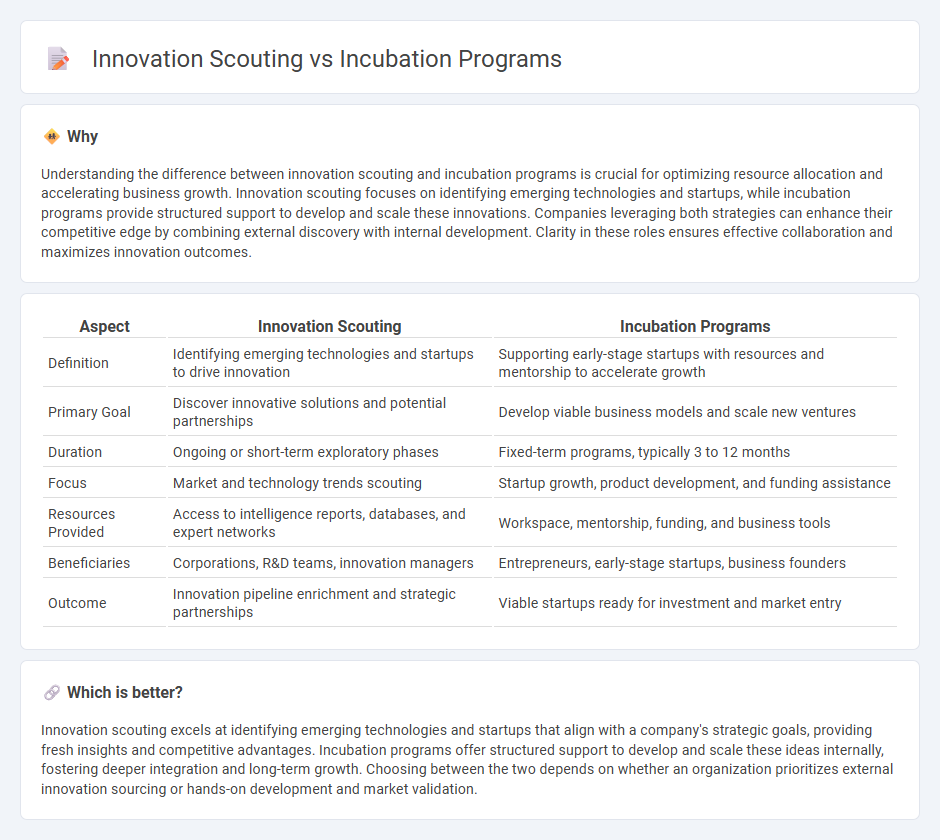
Innovation scouting identifies emerging technologies and startups to integrate breakthrough solutions early, leveraging external expertise and market trends for competitive advantage. Incubation programs nurture selected innovations by providing resources, mentorship, and structured development to accelerate market readiness and growth. Explore how blending innovation scouting with incubation drives transformative business success.
Why it is important
Understanding the difference between innovation scouting and incubation programs is crucial for optimizing resource allocation and accelerating business growth. Innovation scouting focuses on identifying emerging technologies and startups, while incubation programs provide structured support to develop and scale these innovations. Companies leveraging both strategies can enhance their competitive edge by combining external discovery with internal development. Clarity in these roles ensures effective collaboration and maximizes innovation outcomes.
Comparison Table
| Aspect | Innovation Scouting | Incubation Programs |
|---|---|---|
| Definition | Identifying emerging technologies and startups to drive innovation | Supporting early-stage startups with resources and mentorship to accelerate growth |
| Primary Goal | Discover innovative solutions and potential partnerships | Develop viable business models and scale new ventures |
| Duration | Ongoing or short-term exploratory phases | Fixed-term programs, typically 3 to 12 months |
| Focus | Market and technology trends scouting | Startup growth, product development, and funding assistance |
| Resources Provided | Access to intelligence reports, databases, and expert networks | Workspace, mentorship, funding, and business tools |
| Beneficiaries | Corporations, R&D teams, innovation managers | Entrepreneurs, early-stage startups, business founders |
| Outcome | Innovation pipeline enrichment and strategic partnerships | Viable startups ready for investment and market entry |
Which is better?
Innovation scouting excels at identifying emerging technologies and startups that align with a company's strategic goals, providing fresh insights and competitive advantages. Incubation programs offer structured support to develop and scale these ideas internally, fostering deeper integration and long-term growth. Choosing between the two depends on whether an organization prioritizes external innovation sourcing or hands-on development and market validation.
Connection
Innovation scouting identifies emerging technologies and startups with high potential, serving as a critical input for incubation programs that nurture these innovations into viable products or services. Consulting firms leverage innovation scouting to source cutting-edge solutions and integrate them into incubation frameworks that provide mentorship, funding, and market access. This synergy accelerates the commercialization process and drives competitive advantage for clients seeking transformative growth.
Key Terms
Incubation Programs:
Incubation programs provide startups with structured support including mentorship, office space, funding access, and business development resources to accelerate growth and increase their chances of success. These programs often vary in duration, intensity, and industry focus, enabling early-stage companies to refine their products, validate market fit, and build scalable business models. Explore how incubation programs can transform innovative ideas into viable enterprises and boost entrepreneurial ecosystems.
Startup Acceleration
Incubation programs provide structured support including mentorship, office space, and funding opportunities to accelerate startup growth, while innovation scouting identifies cutting-edge technologies and startups to integrate into corporate innovation pipelines. Startup acceleration emphasizes rapid development and market readiness, leveraging both incubation and scouting to maximize potential and scalability. Explore how combining these strategies can turbocharge your startup's success and innovation capacity.
Mentorship
Incubation programs provide structured mentorship by connecting startups with industry experts who offer tailored guidance, resources, and strategic advice to accelerate growth. Innovation scouting focuses on identifying emerging technologies and startups, often facilitating mentorship through external partnerships to integrate innovative solutions into established organizations. Explore how mentorship shapes the success of both approaches by discovering detailed comparisons and case studies.
Source and External Links
How a Business Incubator Program Can Help Your Startup - Business incubators support early-stage startups by providing workspace, seed funding, mentoring, training, and access to essential resources to help launch and grow businesses, often involving an application and interview process for acceptance.
Neighborhood Business Incubators - These incubators focus on helping small, often BIPOC- and immigrant-owned businesses by offering free or low-cost workspace, mentorship, access to investors, working capital, and tailored industry expertise to build sustainable operations.
Business incubator - A business incubator is an organization that develops startups by providing office space, administrative services, mentorship, and resources; companies typically spend an average of 33 months in programs and admission is based on application and feasibility of business plans.
 dowidth.com
dowidth.com